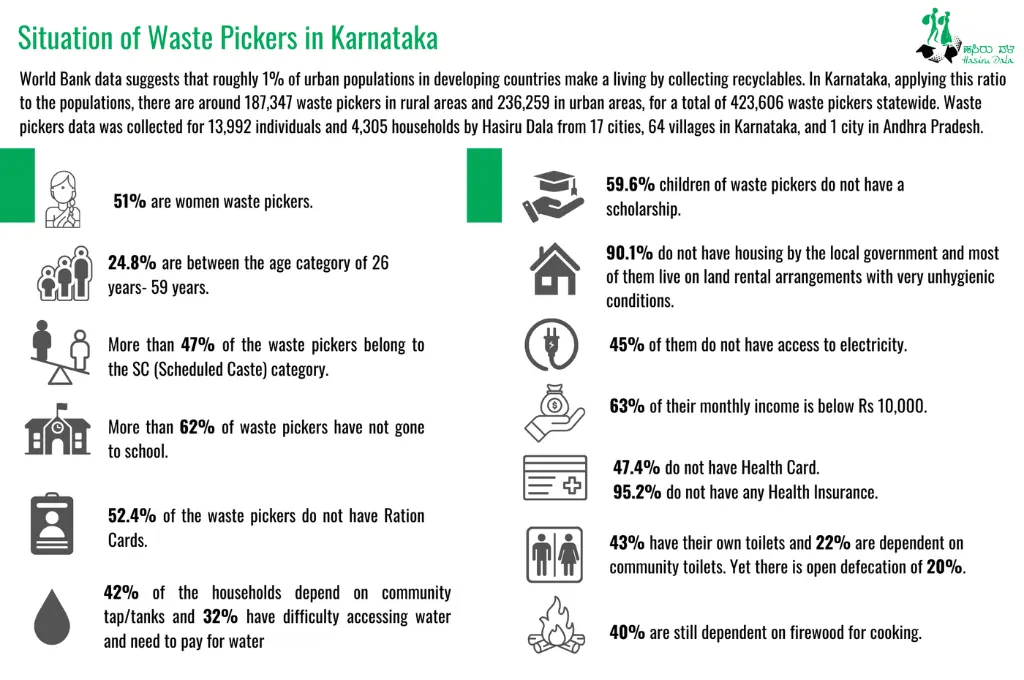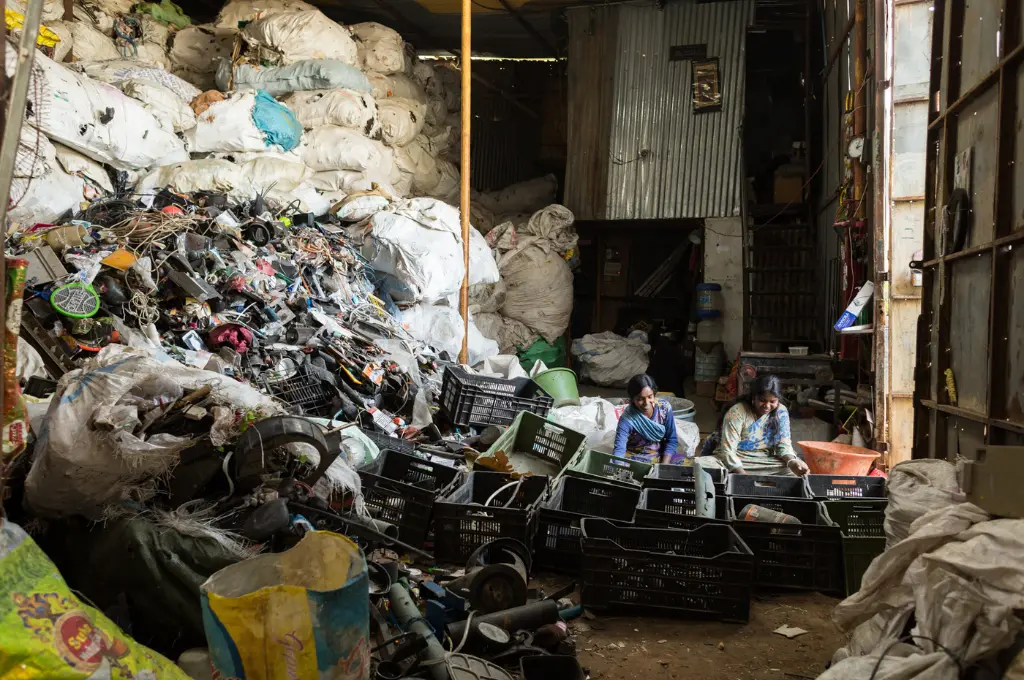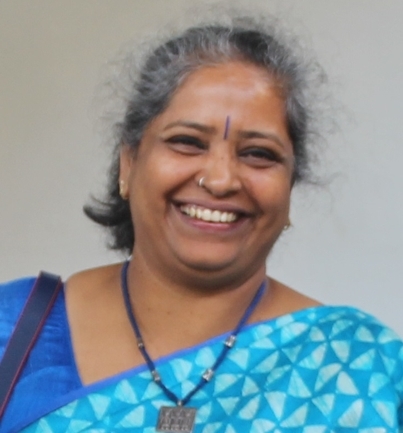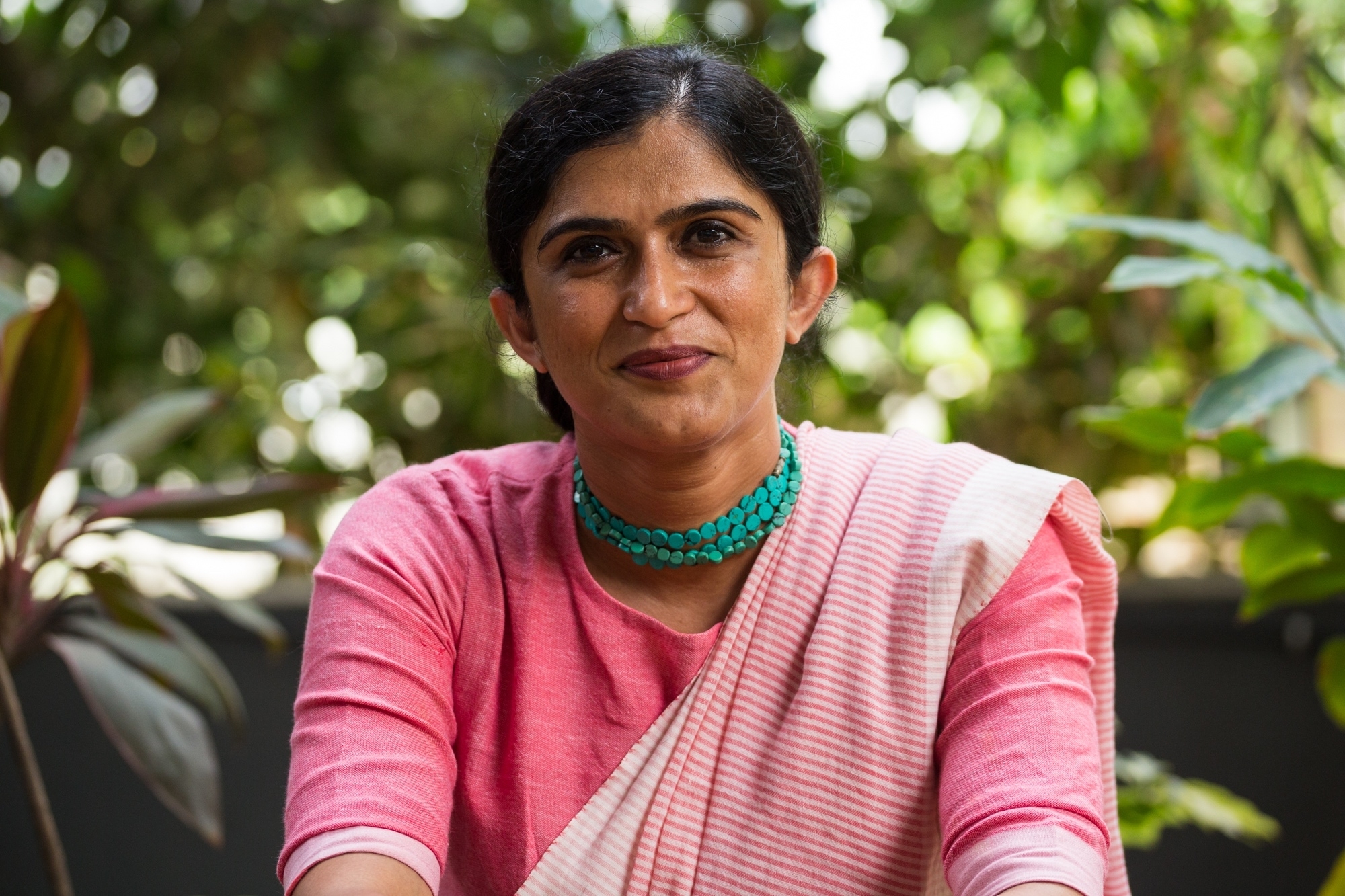A recent survey of waste pickers in Bengaluru revealed that every rupee spent towards enabling their access to government entitlements generated a benefit of INR 9.83 for them. The results are strong evidence that social security initiatives, which provide a safety net for the economically or socially vulnerable, create tangible value for marginalised communities.
Hasiru Dala, which works with waste pickers in Bengaluru, conducted a survey at the end of the first phase of its work with Saamuhika Shakti—a collective of 12 organisations addressing the challenges faced by waste pickers. It used the Social Return on Investment (SROI) methodology, which measures social, health, environmental, and economic impact created by programmes or organisations. The findings of this analysis demonstrated the importance of equitable access to social security schemes.
Research indicates that waste pickers require approximately INR 40,000 per month to support a family of four, factoring in costs for education, housing, and other basic needs. However, Hasiru Dala’s study shows that more than 60 percent of them earn less than INR 10,000. Most have no job security or a link to a formal financial institution. They are often compelled to bridge their income gap through loans, entering a perpetual cycle of debt repayment at usurious rates. This traps them in intergenerational poverty. They also do not have access to basic essential services such as healthcare and education.

Government social security schemes are essential for bridging this income gap. Key entitlements—such as provisions for ration, health cards and medicines, school scholarships, housing, pensions and transportation—are crucial for the waste picker community. However, these schemes are often out of reach for the very people they aim to support.
In Karnataka, a total of 108 social security schemes are available to underserved populations through central, state, and local governance bodies, of which waste pickers are eligible for 94. However, access to these schemes hinges on having updated ‘Know Your Customer’ (KYC) documents, which are issued by various government offices.
Why is it challenging for waste pickers to access social security schemes?
Lack of documentation: Waste pickers require identification (ID) cards, including Aadhaar cards, PAN cards, birth certificates, income certificates, and voter IDs, to apply for government schemes. For waste pickers, who often belong to Scheduled Caste (SC) communities, a caste certificate serves as a critical gateway to accessing certain entitlements. Widows require their spouse’s death certificate to qualify for specific benefits.
Many waste pickers don’t have birth certificates, which prevents them from obtaining Aadhaar cards—a prerequisite for accessing most government schemes. Age certificates are no longer accepted in lieu of these. Due to cultural superstitions and low trust in healthcare systems, home births are common, especially among migrant populations. While the Thayi card for pregnant women in Karnataka offers them some access to nutrition and vaccinations, migrant families are often excluded from the benefits.
Low levels of literacy: Obtaining documentation with accurate details on the card poses a significant hurdle for those who may not be able to read. When waste pickers receive their cards, they may not realise that their documents are incorrect. Often, the names or spellings on the voter ID and Aadhaar do not match.
Digital divide: The shift to digital processes has brought with it its own set of challenges. Many waste pickers lack access to mobile phones needed for one-time passwords (OTPs). A single mobile number often serves up to four people. This creates a dependency on cyber cafes, which may be exploitative. Frequent changes in mobile numbers—often due to harassment from loan sharks or financial insecurities—further complicate the issue.
Procedural roadblocks: Waste pickers find it challenging to navigate the process for essential certificates. It is difficult for daily-wage earners to visit government offices multiple times during work hours and stand in long queues. Waste pickers are also faced with bureaucratic inefficiencies and delays. In Karnataka, an individual can apply for income certificates online but needs to visit the Revenue Department to collect it. Again, Aadhaar card is provided by the central government while caste certificates are issued by the Revenue Department. Additionally, many waste pickers come from historically oppressed communities but find it challenging to acquire caste certificates. They need a school leaving certificate (also known as transfer certificate or TC) to apply for these certificates even if they have never attended school.
Lack of trust: Historical experiences of caste and class discrimination and being labelled ‘unclean’ or ‘thieves’ have led to a deep mistrust of institutions in the community. They often fall victim to fraudulent agents who charge them for documents that are difficult to obtain. Building community members’ trust requires consistent support and guidance from organisations that understand their struggles.
Lack of awareness: Waste pickers are often unaware of the government schemes available to them. Even organisations working with marginalised communities find it difficult to keep abreast of the changes announced by the various government and administrative departments. The lack of systemic outreach remains a significant barrier to underserved communities eligible for welfare schemes.
Creating inclusive systems for social security requires simplified processes, better outreach, and community-centric approaches.

Benefits of accessing social security
Using mobile technology—apps and web platforms—to access and manage social security benefits and services, Hasiru Dala helped waste pickers get PAN cards, Aadhaar cards, bank accounts, Voter IDs, ration cards, health IDs, e-shram cards, etc. This mobile social security (MSS) initiative—undertaken as part of Saamuhika Shakti’s interventions to address the gaps in access to essential livelihood services—facilitated waste pickers’ access to more than 49 government schemes. Over the past four years, the team working on MSS scheme access has covered eight zones across Bengaluru and rural areas, enabling 7,992 successful applications for more than 2,500 individuals.
With social security, waste pickers can access food ration, pensions for disability or age, subsidised or free electricity (under the Gruha Jyothi scheme), health insurance (under the Pradhan Mantri Jan Arogya Yojana), healthcare, and more. For instance, the Shakti Scheme, introduced by the Government of Karnataka, offers free tickets to women on state-run buses and saves a waste picker INR 100 per day on public transport, translating to INR 3,000 per month.
Food security: The National Food Security Act, 2013 enables many to secure essential items such as rice. More than half the waste pickers in Karnataka do not have ration cards. The difference between those who have ration cards and those who don’t was especially stark during the COVID-19 lockdown. In some communities, levels of malnourishment were so severe that state governments had to be alerted for the emergency.
Housing: Focus group discussions during the survey revealed that public housing has a big impact on the well-being of the community. Those living in shanties and blue tarp slums are forced to purchase food in small quantities due to the lack of safe storage and the risk of theft. During floods, many refrain from seeking shelter for fear of losing their belongings. Even under routine circumstances, women waste pickers often face harassment on the street. Stable housing not only alleviates these challenges but also provides a consistent environment, enabling children to attend school regularly. Identity cards and the right paperwork play a big role in securing public housing.
Healthcare: Social security schemes improve healthcare access by enabling enrolment in health insurance programmes and schemes. This facilitates access to secondary and tertiary care, which is vital for waste pickers. However, primary healthcare centres (PHCs) are often inaccessible for migrants, who rely on nearby pharmacies instead. Many waste pickers hesitate to seek care at PHCs because of past experiences of being neglected or dismissed.
Livelihood: Waste pickers traditionally gather dry waste from streets, drains, and some households. With the privatisation of waste management, the collection is being centralised through door-to-door services. While it’s crucial to have an efficient waste collection system to improve urban living standards, it should also be inclusive and provide opportunities for waste pickers, especially those enumerated by local bodies.
The survey revealed that waste pickers with occupational ID cards were treated as professionals and integrated into decentralised waste management through dry waste collection centres (DWCCs). They should also be included in the door-to-door collection and waste processing in the future.
Financial inclusion has also been transformative, with direct deposits, digital payment systems such as UPI, and ATM access providing waste pickers greater financial control and flexibility. These tools are particularly empowering for small entrepreneurs within the community, enabling them to manage their finances more effectively.
The SROI analysis puts a number on the outcomes of social security and dispels many assumptions in the social sector. There is a belief that social security funds do not always reach the intended recipients. Funders wonder whether it’s worth spending money to facilitate access to these entitlements. We also tend to measure social security entitlement in terms of state money unlocked. With insurance, the money is believed to be unlocked for the insured and insurance companies, and with educational scholarships, directly for the students. The SROI shows the substantial impact of access to entitlements in creating a safety net for marginalised communities.
—
Know more
- Read this article on the need for integrating informal waste pickers into the new waste economy.
- Learn why informal workers aren’t using or aware of welfare schemes.
- Learn about the systemic marginalisation and severe health hazards that informal waste pickers experience.







